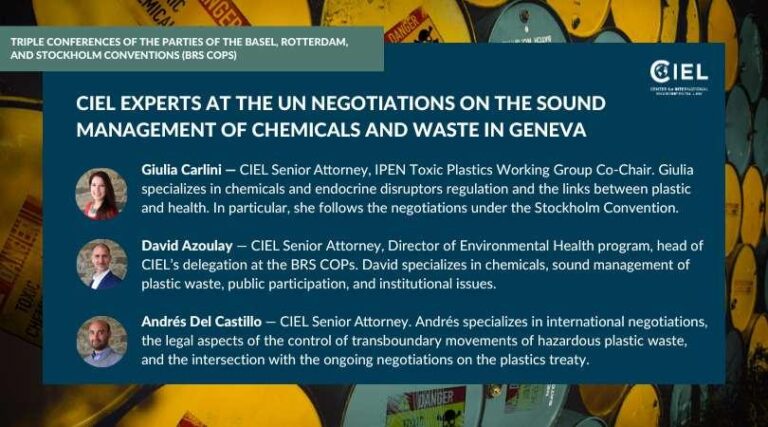CIEL Experts Make Waves at United Nations Ocean Conference in Nice, France
As global leaders gather in Nice, France, for the highly anticipated United Nations Ocean Conference, experts from the Center for International Environmental Law (CIEL) are poised to advocate for urgent action on pressing marine issues. With the theme of the conference focusing on “Scaling Up Ocean Action Based on Science and Innovation for the Implementation of Goal 14: Stocktaking, Partnerships, and Solutions,” CIEL’s team is set to highlight the critical role that international legal frameworks play in safeguarding ocean ecosystems. This year‚Äôs conference comes at a pivotal moment, as the health of our oceans continues to decline due to climate change, pollution, and unsustainable practices. Through panel discussions, workshops, and strategic partnerships, CIEL aims to elevate the discourse on environmental justice and marine protection, ensuring that the voices of affected communities are heard in the global conversation on ocean governance.
CIEL Experts Advocate for Ocean Conservation at UN Conference in Nice
The recent United Nations Ocean Conference in Nice saw a strong presence from CIEL experts, who passionately advocated for urgent measures to protect our oceans. Highlighting the critical role that marine ecosystems play in regulating global climate and supporting biodiversity, they emphasized the need for integrated legal frameworks to safeguard these invaluable resources. Key discussions revolved around:
- Strengthening International Treaties: Enhancing the effectiveness of existing legal agreements to address marine pollution and overfishing.
- Promoting Sustainable Practices: Encouraging countries to adopt policies that balance marine conservation with economic activities.
- Empowering Coastal Communities: Ensuring that local voices are included in conservation strategies to protect their livelihoods and heritage.
In a dedicated session, CIEL experts presented a framework for achieving marine sustainability, underscoring the necessity for cooperation among nations. They called for:
| Action Item | Description |
|---|---|
| Global Partnership | Encourage nations to collaborate on transboundary marine conservation efforts. |
| Data Sharing | Facilitate the exchange of research and data on marine ecosystems. |
| Adequate Funding | Secure financial support for conservation initiatives and community-led projects. |
By emphasizing these key areas, CIEL is positioning itself as a proactive participant in the global dialogue on ocean conservation, aiming to inspire actionable commitments that ensure the health of marine environments for future generations.
Strategies for Sustainable Marine Resource Management Highlighted
During the United Nations Ocean Conference in Nice, experts from the Center for International Environmental Law emphasized the urgent need for multifaceted approaches to preserve marine ecosystems. Key strategies discussed include:
- Community Engagement: Involving local communities in the decision-making process to ensure that their knowledge and needs are addressed.
- Science-Based Management: Utilizing the latest research to guide sustainable fishing practices and habitat protection.
- Integrated Coastal Zone Management: Recognizing the interconnectedness of land and marine resources and promoting policies that harmonize their use.
The experts identified successful case studies from around the globe that demonstrate these strategies in action. For instance, a recent initiative in the Caribbean adopted an ecosystem-based management approach, leading to significant improvements in fish populations and habitat health. A comparative analysis of various programs is illustrated in the table below:
| Region | Strategy Utilized | Results Achieved |
|---|---|---|
| Caribbean | Ecosystem-Based Management | Increased fish stocks by 40% |
| South Pacific | Cultural Heritage Approaches | Restoration of traditional fishing practices |
| North Atlantic | Collaborative Governance | Strengthened enforcement of fishing quotas |
Strengthening International Law for Ocean Protection: Key Recommendations from CIEL
At the recent United Nations Ocean Conference held in Nice, France, experts from the Center for International Environmental Law (CIEL) showcased a roadmap for enhancing international law to ensure the protection of the world’s oceans. The recommendations focus on fostering collaborative governance frameworks that prioritize sustainability and address illegal, unreported, and unregulated (IUU) fishing, marine pollution, and the impacts of climate change. Key proposals include:
- Enhancing Legal Mechanisms: Strengthening existing treaties and creating new instruments to govern marine biodiversity beyond national jurisdiction.
- Promoting Equitable Access: Ensuring equitable access to ocean resources, particularly for developing countries, to promote sustainable livelihoods.
- Building Capacity: Investing in capacity-building initiatives to empower coastal communities and governments in ocean management.
Furthermore, CIEL advocates for increased transparency and accountability at all levels. This involves engaging a broader range of stakeholders, from local communities to international organizations, in decision-making processes. The organization emphasizes the need for robust monitoring systems to track ocean health and ensure compliance with regulations. A summary of the recommendations includes:
| Recommendation | Target Area |
|---|---|
| Implement marine protected areas (MPAs) | Biodiversity Conservation |
| Establish global standards for fishing practices | IUU Fishing |
| Set emission reduction targets for maritime industries | Climate Change Mitigation |
Engaging Local Communities in Ocean Governance: A Path Forward
At the United Nations Ocean Conference in Nice, CIEL experts emphasized the necessity of integrating local communities into ocean governance frameworks. The success of sustainable ocean management relies heavily on the knowledge and experiences of those who inhabit coastal areas. By fostering collaboration between local stakeholders and decision-makers, we can create a more inclusive and effective governance structure that reflects the true needs of those most affected by ocean policies. This approach ensures that traditional ecological knowledge is valued and incorporated into the strategies aimed at protecting marine ecosystems.
To effectively engage local communities, CIEL advocates for the following strategies:
- Capacity Building: Strengthening local organizations through training and resources to enhance their participation in decision-making processes.
- Transparent Communication: Establishing clear channels of communication to disseminate information about ocean governance initiatives to all stakeholders.
- Inclusive Policy Development: Involving local voices in the creation of laws and regulations that govern marine resources, ensuring they align with community needs and priorities.
| Key Elements | Benefits |
|---|---|
| Community Engagement | Fostering trust and cooperation |
| Local Knowledge Integration | Enhancing policy effectiveness |
| Adaptive Management Strategies | Enhancing resilience amid climate change |
Wrapping Up
In conclusion, the participation of CIEL experts at the United Nations Ocean Conference in Nice stands as a testament to the organization’s commitment to environmental advocacy and sustainable ocean governance. Their insights and proposals are vital as global leaders grapple with pressing oceanic challenges such as overfishing, pollution, and climate change. As the conference progresses, CIEL continues to emphasize the importance of integrating legal frameworks with science-based solutions to protect our oceans for future generations. The dialogue initiated in Nice will undoubtedly influence policy-making in the years to come, reinforcing the collective responsibility of nations to safeguard the health of our seas. Stakeholders and policymakers alike must take heed of these discussions, as the fate of our oceans hangs in the balance.




